- Home
- Nawal El Saadawi
God Dies by the Nile and Other Novels
God Dies by the Nile and Other Novels Read online
PRAISE FOR GOD DIES BY THE NILE
‘A quietly formidable achievement; its understated evocation of tragedy and strength in the face of victimization make it a graceful classic.’ – Women’s Review
‘Powerfully political.’ – Poetry Nation Review
‘Nawal El Saadawi’s achievement is to lay bare the thin flesh and huge passions of her characters.’ – West Indian Digest
PRAISE FOR SEARCHING
‘Nawal El Saadawi once again presents a psychological drama that will take you into the depths of a woman’s despair. Intimate details and vivid descriptions fill this story of an ordinary person who ends up teetering over the abyss of insanity… This is a novel of Cairo with the languid Nile winding its way through a story of love, guilt, betrayal and redemption.’ – Miriam Cooke, Professor of Modern Arabic Literature, Duke University
‘Searching is an intense exploration of the state of mind of a young Egyptian woman who longs for both professional and personal meaning in her life, but finds herself isolated and adrift in a Kafkaesque world of senseless work. Saadawi creates a hellish vision of Cairo. Her protagonist finds herself utterly alone in a world dominated by casual, brutal patriarchy and a shadowy authoritarian state. This is a disturbing text that makes the reader feel trapped in a world that often feels like a particularly bad recurrent dream.’ – Jane Plastow, Professor of African Theatre, Leeds University
PRAISE FOR THE CIRCLING SONG
‘To read this book is like looking into a kaleidoscope; as each new element in the story is added, so a new configuration is formed.’ – Independent
‘Nawal El Saadawi’s technique is impressive: at once precise, controlled and hypnotic, even in translation. The style and meaning of the book are one. A song with no beginning and no end, the author tells its universal story.’ – Everywoman
‘This novel is a powerful example of the kind of anger and desperation to which Arab women writers are beginning to give vent.’ – Choice
‘Nawal El Saadawi is a legend in her own time. This is an ambitious work indeed.’ – American Book Review
‘One of Saadawi’s most powerful books that we have had the privilege to read in English. Unusual, original and unexpected, it’s one of those very rare books which address you in many languages and can take you in many different directions at once.’ – Spare Rib
ABOUT THE AUTHOR
Nawal El Saadawi is an internationally renowned writer, novelist and fighter for women’s rights both within Egypt and abroad.
Born in 1931, in a village outside Cairo, she wrote her first novel, Diary of a Child Called Souad, at the age of thirteen. Unusually, she and her brothers and sisters were educated together. After graduating from the University of Cairo Medical School in 1955, specializing in psychiatry, she practised as a medical doctor for two years.
From 1963 until 1972, Saadawi worked for the Egyptian government as Director General for Public Health Education. During this time, she studied at Columbia University in New York, where she received her Master’s degree in Public Health in 1966. In 1972, however, she lost her job in the government as a result of political pressure. The magazine Health, which she founded and had edited for more than three years, was closed down.
From 1973 to 1978 Saadawi worked at the High Institute of Literature and Science. It was at this time that she began to write, in works of fiction and non-fiction, the books on the oppression of Arab women for which she has become famous. Her most renowned novel, Woman at Point Zero, was published in Beirut in 1973. It was followed in 1976 by God Dies by the Nile and in 1977 by her study of Arab women, The Hidden Face of Eve.
In 1981 Nawal El Saadawi publicly criticized the one-party rule of President Anwar Sadat, and was subsequently arrested and imprisoned. She was released one month after Sadat’s assassination. In 1982, she established the Arab Women’s Solidarity Association, which was outlawed in 1991. For some years during the Mubarak regime, Saadawi lived in exile, teaching in universities in the USA and Europe, including Duke University and Washington State University. Saadawi returned to Egypt in 1996. In 2004 she presented herself as a candidate for the presidential elections in Egypt, with a platform of human rights, democracy and greater freedom for women. In July 2005, however, she was forced to withdraw her candidacy in the face of ongoing government persecution.
Nawal El Saadawi has achieved widespread international recognition for her work. She holds honorary doctorates from, among others, the universities of York, Illinois at Chicago, St Andrews and Tromso as well as Universidad Nacional Autónoma de México. Her many prizes and awards include the Premi Internacional Catalunya in 2003, the Council of Europe North–South Prize in 2004, the Women of the Year Award (UK) in 2011, the Sean MacBride Peace Prize (Ireland) in 2012, and the French National Order of Merit in 2013. Her books have been translated into over forty languages worldwide. They are taught in universities across the world.
GOD DIES BY
THE NILE
AND OTHER NOVELS
GOD DIES BY THE NILE • SEARCHING
THE CIRCLING SONG
NAWAL EL SAADAWI
TRANSLATIONS BY SHERIF HETATA, SHIRLEY EBER
God Dies by the Nile and Other Novels was first published in 2015 by Zed Books Ltd, Unit 2.8 The Foundry, 17 Oval Way, London SE115RR, UK
www.zedbooks.co.uk
God Dies by the Nile was first published in Arabic in Beirut in 1974, under the title The Death of the Only Man on Earth, and first published in English in 1985 by Zed Books Ltd.
Copyright © Nawal El Saadawi, 1974, 1985, 2007
Foreword copyright © Nawal El Saadawi, 2007
English translation copyright © Zed Books Ltd, 1985
Searching was first published in English in 1991 by Zed Books Ltd.
Copyright © Nawal El Saadawi 1991, 2009
Foreword copyright © Anastasia Valassopoulos 2009
The Circling Song was first published in English in 1989 by Zed Books Ltd
Copyright © Nawal El Saadawi 1989, 2009
Foreword copyright © Fedwa Malti-Douglas 2009
The right of Nawal El Saadawi to be identified as the author of this work have been asserted by her in accordance with the Copyright, Designs and Patents Act, 1988
All rights reserved. No part of this publication may be reproduced, stored in a retrieval system or transmitted in any form or by any means, electronic, mechanical, photocopying or otherwise, without the prior permission of Zed Books Ltd.
A catalogue record for this book is available from the British Library
ISBN 978-1-78360-596-5 pb
ISBN 978-1-78360-597-2 hb
ISBN 978-1-78360-744-0 pdf
ISBN 978-1-78360-745-7 epub
ISBN 978-1-78360-746-4 mobi
CONTENTS
GOD DIES BY THE NILE
SEARCHING
THE CIRCLING SONG
GOD DIES
BY THE NILE
NAWAL EL SAADAWI
TRANSLATED BY SHERIF HETATA
INTRODUCTION
I was six or seven years of age when I heard about a poor peasant girl who drowned herself in the Nile – she had been working in the house of the village mayor. My grandmother whispered something that I didn’t understand in my mother’s ear. At the age of ten I heard about another girl who fled during the night. She was a servant in the same house, fourteen years old and pregnant. Nobody accused the mayor, except a young peasant who had been planning to marry the girl. He was shot in the fields and no-one was captured. In a dream, I saw the mayor in prison accused of raping servant girls and robbing the women of their harvest. When I told my grandmother, she said it was impossible
, that the mayor was a god and no-one could punish him. She said that the mayor exploited the peasants to serve the king’s interest, and the king exploited the mayor and the peasants to serve the interests of the British army in the Suez canal. The word ‘god’ echoed around me but I didn’t know its real meaning and I instinctively didn’t like it. My parents gave my brother more freedom and more food than me, though I was better at school and helped my mother more. When I asked why, they told me that it is what God said. I felt that God was unjust like the mayor and the king, and that he deserved to be punished, but I kept this to myself.
These women and men in my village inspired me to write God Dies by the Nile. Zakeya is not very different from my grandmother and my aunts, relatives and neighbours. In addition to the oppression of colonial rule at that time, women were oppressed by men in the family, in society and in the streets. Poor women were more vulnerable than rich women.
In 1972 I published my first non-fiction book about women and sex. It was banned by the authorities and I was promptly dismissed from my post in the government. I found myself at home with nothing to do but write. I wrote fiction partly because I enjoyed it more, and partly because it seemed less likely to be banned – most of the censors were half-literate civil servants on low salaries, I did not imagine that they would read novels. I sat alone in my small apartment in Giza thinking about my new novel. I don’t know why my childhood memory came back to me, especially the image of the mayor and his men sitting smoking by the banks of the Nile, looking at the girls walking past with jars on their heads. The faces of my grandmother and other poor women in my family appeared vividly to me. I finished the novel in two months. Writing it gave me enormous pleasure, a pleasure which sustained me inside prison, and which is more essential to me than breathing.
At that time, Sadat was pursuing his so-called ‘open door policy’, opening Egypt to foreign, especially American, goods and investment. The result was increased poverty, unemployment, religious fundamentalism and the veiling of and discrimination against women. The Islamization of Egypt went hand in hand with the Americanization. The shops sold imported veils from the USA and Saudi Arabia and prayer mats from Mecca, alongside red lipstick and tight blue jeans. The majority of people in Egypt were deprived of their basic material needs. Our television screens were flooded with religious men preaching chastity, modesty, spirituality and the veil, interspersed with adverts that used naked women’s bodies to sell imported foreign goods. For women, the veil and female genital mutilation came to be part of authentic Islamic identity. I found it impossible to be silent. I published my articles in opposition newspapers and eventually found myself in prison, accused of betraying Egypt. One month later, however, in 1981, Sadat was assassinated and I was released by the new president.
God Dies by the Nile didn’t escape this climate of censorship and oppression. Like most of my work, it had to be published in Lebanon. My Lebanese publisher in Beirut changed the title to Death of the Only Man on Earth. He told me that God cannot die, and when I tried to explain that the word god is a symbol for the head of the village, he said ‘Yes, I know, but religious fanatics will not understand this and will burn my publishing house.’ This actually happened several years later. In 1982 God Dies by the Nile was published, with another fourteen of my books, by a publisher called Madbouli in Cairo. He used the Lebanese title. He said ‘They will burn my publishing house if I publish a book with a title like that. God does not die, he lives eternally.’
Thus the book was never published in Arabic with its original title, although it is reprinted to this day. Ten editions at least have come out since I wrote it. I think many women and men still read it. I have received many letters from readers saying that the village in the novel did not differ much from their village. Some men were angry and accused me of mocking Islam and encouraging heresy.
Though it was written more than thirty years ago, I feel that God Dies by the Nile still describes the life of peasant women and men in Egypt. The existing regime is no better than the Sadat regime – even worse. Poverty, American neocolonialism and religious fundamentalism have continued to rise. I visit my village every now and then and I see that it still resembles Zakeya’s village. Perhaps this is why people still read the book and why publishers still reprint it. The novel has been translated into many languages, including English, and I’m glad that its original title has not been changed. God still dies by the Nile.
Nawal El Saadawi
Cairo, 2006
I
Before the crimson rays of dawn touched the treetops, before the cry of the cock, the bark of a dog, or the bray of a donkey pierced through the heavy darkness, or the voice of ‘Sheikh Hamzawi’ echoed in the silence with the first call to prayer, the big wooden door opened slowly, creaking, with the rusty sound of an ancient water-wheel. A tall, upright shadow slipped through and advanced on two legs with a powerful steady stride. Behind, followed a second shadow, on four legs which seemed to bend beneath it, as it slouched forwards with a lazy, ambling gait.
The two shadows disappeared into the darkness to emerge out of it again over the river bank. Zakeya’s face stood out in the pale light of dawn, gaunt, severe, bloodless. The lips were tightly closed, resolute, as though no word could ever pass through them. The large, wide-open eyes fixed on the horizon expressed an angry defiance. Behind her, the head of the buffalo nodded up and down, its face gaunt and bloodless, but not unkind, its wide-open eyes humble, broken, resigned to whatever lay ahead.
The light of dawn glimmered on the river, revealing the minute waves, like tiny wrinkles in an old, sad, silent face. Deep underneath, its waters seemed immobile, their flow as imperceptible as a moment of passing time, or the slow movement of the clouds in the dark sky.
In the wide-open spaces the air, too, was hushed and silent. It slipped through the branches of the trees so gently that they barely moved, but it continued to carry the fine, invisible particles of dust from over the high bank of the river, down the slope to the dark, mud huts huddled in rows, their tiny windows closed, their low, uneven roofs stacked with mounds of dry cotton sticks, cakes of dung and straw, then further down into the narrow twisting lanes and alleys blocked with manure, and on to the stream which completed the village contour, where they settled to form a dark, slimy, oozing layer covering its green water.
Zakeya continued to walk with the buffalo behind her, her legs moving at the same unchanging pace, as unchanging as the set look on her face, as the immobile waters of the river to her left, as everything else in these last moments of the night. But to her right there was a slow shift as the mud huts started to pass behind, and the fields emerged before her eyes like a green ribbon laid out parallel to the Nile.
She advanced between the two stretches of green and brown with the same swinging movement starting from the hips and thighs. Overhead, the black night withdrew gradually as the crimson hue of dawn spread out, then, after a while, changed to a glaring, orange light. Suddenly, over the edge of the earth a point of sun shone out, grew slowly to become a disc of fire, then climbed up into the sky. But before the light of day had chased away the night, Zakeya had already reached her field, tied the buffalo to the water-wheel beside the stream, removed her black shawl and put it on the ground, rolled up her sleeves, and tied the tail of her galabeya* around her waist.
Now her hoe could be heard, thudding out over the neighbouring fields with a steady sound, as it cut deep into the ground. The muscles in her arms stood out, and below the black galabeya knotted tightly around her waist, the long powerful legs showed naked and brown in the morning light; the features of her face were still the same, still sharp, still gaunt, no longer pale, but dark with the leathery tan bitten into them by heat and dust, and sun and open space. Yet deep underneath was the same pallor which her skin revealed before and now concealed. Her body no longer stood upright. It was bent over the hoe as she dug away in the soil. Her eyes did not look at the ground, were not fixed to her feet. They were
the same. They had not changed. They were raised, fixed to some distant point with the same angry defiance which looked out of them before. And the blows of her hoe seemed to echo with an anger buried deep down as she lifted it high up in the air and swung it down with all her might into the soil.
Its blows resounded with their regular sound like the muffled strokes of a clock striking out the hour. They devoured time, moved forwards machine-like, cut into the earth hour after hour. They never tired, never broke down, or gasped for breath, or sought respite. They went on with a steady thud, thud, thud echoing in the neighbouring fields throughout the day, almost inhuman, relentless, frightening in the fury of their power. Even at midday, when the men broke off for a meal and an hour of rest, they went on without a stop. The buffalo might cease turning round and round for a short while, and the water-wheel would stop creaking for a moment, but her hoe kept on falling and rising, rising and falling from sky to earth, and earth to sky.
The sun rose up in the sky gradually. Its disc turned into a ball of fire, choking the wind, bearing down on the trees, turning everything into solid dryness, so that all things seemed to suffocate, burn in its red fire, and dry up, except the rivulets of sweat pouring down from Zakeya’s face and body on to the ground. Beneath the sweat her face was livid like the face of the buffalo turning round and round beneath its yoke.
The hours passed. The sun began to lean towards the earth in a slow, sweeping movement. Its flames no longer burned with the same ire. The heat subsided, and the air stirred, wafting a soft breeze with it from the waters of the Nile. The tree tops swayed from side to side unwillingly, as though spent out. Once more the sky was bathed in a glaring, orange light, gradually swept aside by the sad, grey hue of beginning twilight. The sweat on her face dried up leaving a layer of dust behind like ashes on a dying fire. She threw the hoe on one side, stretched the muscles of her back and stood upright. She looked around for a moment as though awakened in the night, then rolled down her sleeves and untied the knotted folds of her long, black garment before letting it drop down over her legs to the ground. She drew the shawl around her head, and stepped out of the field on to the dusty track. A few moments later she was once more a dark shadow walking back over the same path, with the same steady step, and with the buffalo plodding slowly behind. Now the green expanses of the fields were to her left, and the brown waters of the Nile on her right. In the distance the trees had become slender black silhouettes etched against the greying sky. The sun had dropped below the earth, and to the west, its crimson light no longer fought against the dusk.

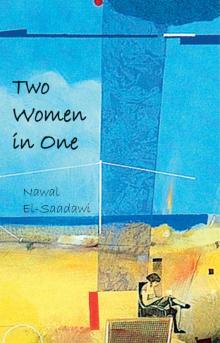 Two Women in One
Two Women in One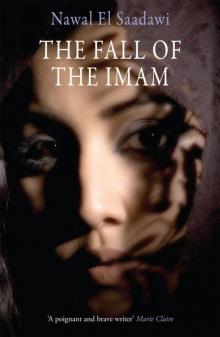 The Fall of the Imam
The Fall of the Imam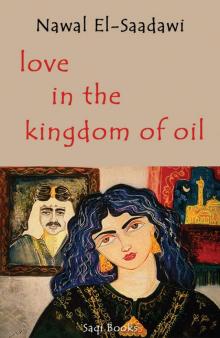 Love in the Kingdom of Oil
Love in the Kingdom of Oil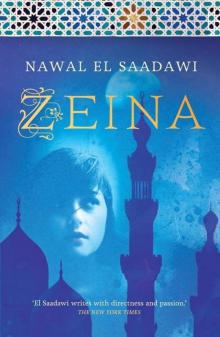 Zeina
Zeina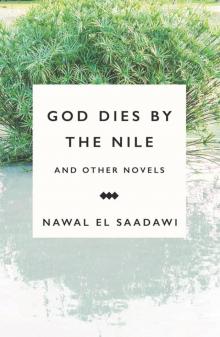 God Dies by the Nile and Other Novels
God Dies by the Nile and Other Novels